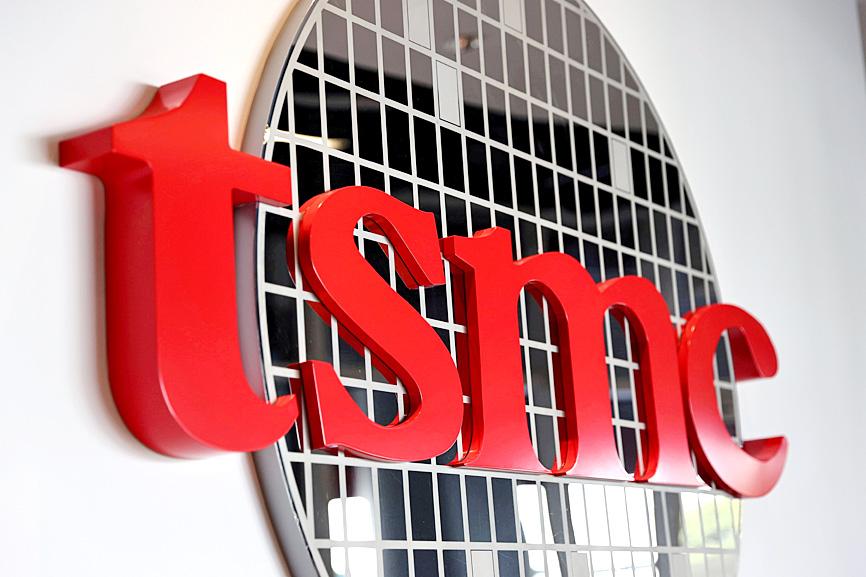Taiwan Semiconductor Manufacturing Co (TSMC, 台積電) is in early talks with the German government about potentially establishing a plant in the country, a senior executive said on Saturday.
Various factors, including government subsidies, customer demand and the talent pool, would influence its final decision, TSMC senior vice president of Europe and Asia sales Lora Ho (何麗梅) told reporters on the sidelines of a technology forum in Taipei.
The discussions come as the EU and others seek to increase domestic chip production to mitigate the risk of supply chain disruptions.

Photo: Ann Wang, Reuters
The chipmaker has not discussed incentives with Berlin or decided on a location, Ho said.
TSMC chairman Mark Liu (劉德音) in June told shareholders that the Hsinchu-based company had begun assessments on setting up manufacturing operations in the European country.
The world’s largest contract chipmaker, which mostly produces domestically, has started to diversify over the past year to help meet demand in various major countries seeking to bolster domestic semiconductor production out of national security and self-sufficiency concerns.
It is building a US$12 billion facility in Arizona, and is set to soon start construction of a US$7 billion plant in Japan.
Meanwhile, the EU said it would unveil the “European Chips Act” in the first half of next year as part of its strategy to boost semiconductor production.
One of the goals would be to account for 20 percent of global production by 2030, the bloc said.
Separately, research teams at Intel Corp on Saturday unveiled work that the US company believes would help it keep speeding up and shrinking computing chips over the next 10 years, with several technologies aimed at stacking parts of chips on top of each other.
Intel’s Research Components Group introduced the work in papers at an international conference held in San Francisco.
The company is working to regain a lead in making the smallest, fastest chips that it has lost in the past few years to rivals like TSMC and Samsung Electronics Co.
The newly unveiled research gives a look into how Intel plans to compete beyond 2025.
One of the ways Intel is packing more computing power into chips by stacking up “tiles” or “chiplets” in three dimensions rather than making horizontally designed chips, it said.
Intel showed work that could allow for 10 times as many connections between stacked tiles, meaning that more complex tiles can be stacked on top of one another.
However, perhaps the biggest advance showed at the event was a research paper demonstrating a way to stack transistors — tiny switches that form the most basic building blocks of chips by representing the ones and zeros of digital logic — on top of one another.
Intel believes the technology would yield a 30 to 50 percent increase in the number of transistors it can pack into a given area on a chip.
Raising the number of transistors is the main reason chips have consistently gotten faster over the past 50 years.
“By stacking the devices directly on top of each other, we’re clearly saving area,” Intel Components Research Group director Paul Fischer said. “We’re reducing interconnect lengths and really saving energy, making this not only more cost efficient, but also better performing.”

South Korea’s equity benchmark yesterday crossed a new milestone just a month after surpassing the once-unthinkable 5,000 mark as surging global memory demand powers the country’s biggest chipmakers. The KOSPI advanced as much as 2.6 percent to a record 6,123, with Samsung Electronics Co and SK Hynix Inc each gaining more than 2 percent. With the benchmark now up 45 percent this year, South Korea’s stock market capitalization has also moved past France’s, following last month’s overtaking of Germany’s. Long overlooked by foreign funds, despite being undervalued, South Korean stocks have now emerged as clear winners in the global market. The so-called “artificial intelligence

NEW IDENTITY: Known for its software, India has expanded into hardware, with its semiconductor industry growing from US$38bn in 2023 to US$45bn to US$50bn India on Saturday inaugurated its first semiconductor assembly and test facility, a milestone in the government’s push to reduce dependence on foreign chipmakers and stake a claim in a sector dominated by China. Indian Prime Minister Narendra Modi opened US firm Micron Technology Inc’s semiconductor assembly, test and packaging unit in his home state of Gujarat, hailing the “dawn of a new era” for India’s technology ambitions. “When young Indians look back in the future, they will see this decade as the turning point in our tech future,” Modi told the event, which was broadcast on his YouTube channel. The plant would convert

‘SEISMIC SHIFT’: The researcher forecast there would be about 1.1 billion mobile shipments this year, down from 1.26 billion the prior year and erasing years of gains The global smartphone market is expected to contract 12.9 percent this year due to the unprecedented memorychip shortage, marking “a crisis like no other,” researcher International Data Corp (IDC) said. The new forecast, a dramatic revision down from earlier estimates, gives the latest accounting of the ongoing memory crunch that is affecting every corner of the electronics industry. The demand for advanced memory to power artificial intelligence (AI) tasks has drained global supply until well into next year and jeopardizes the business model of many smartphone makers. IDC forecast about 1.1 billion mobile shipments this year, down from 1.26 billion the prior

People stand in a Pokemon store in Tokyo on Thursday. One of the world highest-grossing franchises is celebrated its 30th anniversary yesterday.